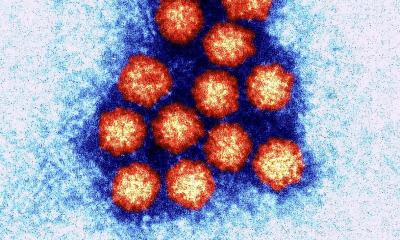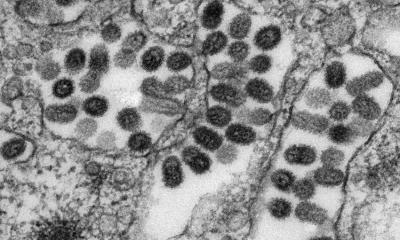Image source: Scientific Animations, Inc.
News • EMA recommandation for Ervebo
Ebola: first vaccine to protect against deadly virus
It is an important step towards fighting one of the deadliest viruses known to man: The human medicines committee (CHMP) of the European Medicines Agency (EMA) has recommended granting a conditional marketing authorisation in the European Union for Ervebo (rVSVΔG-ZEBOV-GP), the first vaccine for active immunisation of individuals aged 18 years and older at risk of infection with the Ebola virus.
“The CHMP’s recommendation is the result of many years of collaborative global efforts to find and develop new medicines and vaccines against Ebola,” said Guido Rasi, EMA’s Executive Director. “Public health authorities in countries affected by Ebola need safe and efficacious medicines to be able to respond effectively to outbreaks and save lives.”
Recommended article

News • Study
Half of Ebola outbreaks go undetected
Half of Ebola outbreaks have gone undetected since the virus was discovered in 1976, scientists at the University of Cambridge estimate. The new findings come amid rising concern about Ebola in the Democratic Republic of Congo, and highlight the need for improved detection and rapid response to avoid future epidemics.
Ebola virus disease is a rare but severe illness caused by the Ebola virus. Death rates in patients who have contracted the disease have varied from 25% to 90% in past outbreaks. The largest outbreak to date occurred in West Africa in 2014-2016 with more than 11,000 deaths. The current outbreak in the Democratic Republic of Congo (DRC) which is caused by Ebola Zaire, has shown case fatality rates of approximately 67%. More than 3,000 people have been infected with the Ebola virus during the ongoing outbreak, which was declared a public health emergency of international concern by the World Health Organization (WHO) in July 2019.
Ervebo is a genetically engineered, replication-competent, attenuated live vaccine. Data from clinical trials and compassionate use programs have shown that Ervebo protects against Ebola virus disease in humans following a single dose administration.
The clinical development of Ervebo was initiated in response to the 2014-2016 Ebola outbreak in cooperation with public health stakeholders, including national institutes of health, ministries of health in countries such as Guinea and DRC, WHO, the US Centers for Disease Control and Prevention, the Public Health Agency of Canada, Médecins Sans Frontières and others. In the ongoing Ebola outbreak in DRC, the vaccine is being used under an Expanded Access Protocol or ‘compassionate use’ to protect people at highest risk of infection such as healthcare workers, or people who have come into contact with infected patients or contacts of contacts according to a ring vaccination strategy.
Ervebo has been tested in approximately 16,000 individuals involved in several clinical studies in Africa, Europe and the United States where it has been proven to be safe, immunogenic (i.e. able to make the immune system respond to the virus) and effective against the Zaire Ebola virus that circulated in West Africa in 2014-2016. Preliminary data suggest that it is effective in the current outbreak in DRC. Additional efficacy and safety data are being collected through the Expanded Access Protocol and should be included in post-marketing safety reports, which are continuously reviewed by EMA.
Recommended article

News • T cell response
Scientists find out what makes people survive Ebola
Scientists conducting the first comprehensive study of key immune system cells—collected from West African Ebola survivors— have made a surprising discovery that provides important clues to developing effective vaccines against the infection.
Ervebo was supported through EMA's PRIority MEdicines (PRIME) scheme, which provides early and enhanced scientific and regulatory support to medicines that have a particular potential to address patients' unmet medical needs. Ervebo was granted eligibility to PRIME in June 2016 for active immunisation against Ebola. “EMA’s positive opinion for the first vaccine against Ebola virus disease demonstrates the scientific expertise in the EU that can be mobilised to reduce the impact of deadly diseases like Ebola,” said Harald Enzmann, Chair of the CHMP.
Currently, there are no therapies approved for Ebola. EMA is working together with regulatory authorities around the world to support WHO and to advise on possible pathways for the development, evaluation and approval of medicines and vaccines to fight Ebola. The Agency has collaborated with WHO and African national regulatory agencies during the review of Ervebo in order to speed up WHO prequalification and approval in countries where the vaccine is mostly needed. EMA representatives have also supported discussions with WHO and stakeholders on the design of clinical trials for investigational agents for the treatment of Ebola disease to gather robust evidence that could support future approvals.
Ervebo received a positive opinion for a conditional marketing authorisation from the CHMP as further information related to the manufacturing process can only be submitted in the coming months. This was considered appropriate in light of the ongoing public health emergency in DRC. The opinion adopted by the CHMP is an intermediary step on Ervebo’s path to patient access. The opinion will now be sent to the European Commission for the adoption of a decision on an EU-wide marketing authorisation.
Source: European Medicines Agency (EMA)
21.10.2019







